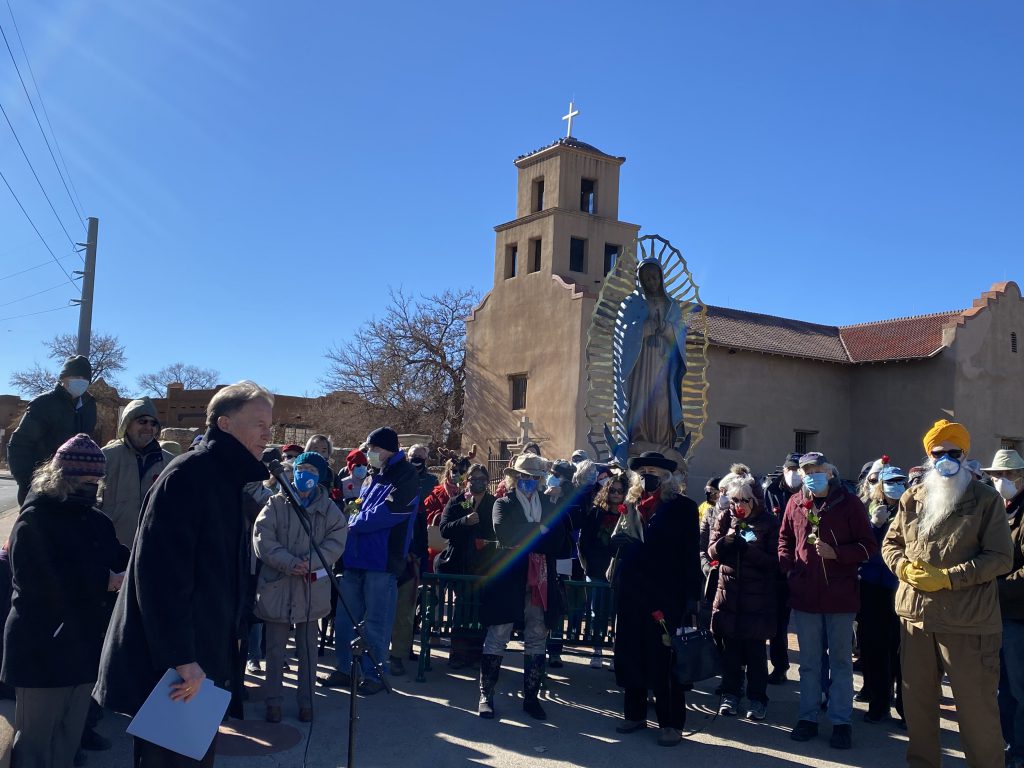At least 125 people were present for the service, many bearing roses in honor of the Lady of Guadalupe. Among them was Karen Weber, who said it’s “highly symbolic” for Wester to speak out on the “abolishment of nuclear weapons.”
SANTA FE NEW MEXICAN By Robert Nott rnott@sfnewmexican.com
Looking up at the sky as a young teen one day in Daly City, Calif., Archbishop John C. Wester had one thought as he saw military planes overheard.
Were they ours, or were they Russian planes?
The year was 1962, perhaps the first time nuclear war between the two superpowers seemed likely to erupt as the Cuban Missile Crisis played out and students were taught to prepare for an atomic attack by diving under their desks at schools.
“I don’t think going under our desks was very helpful,” Wester said Sunday in Santa Fe, moments before issuing a call for the world to rid itself its nuclear weapons.

Now, some 60 years later, he said he wants to do more to end the threat of an atomic war. Wester spoke and prayed during a 30-minute prayer service and ceremony at the Shrine of Our Lady of Guadalupe before he unveiled a sign bearing an image of Pope Francis and a quote uttered by the pope in Hiroshima in 2020: “The possession of nuclear arms is immoral.”
Wester said “our archdiocese needs to be facilitating, encouraging an ongoing conversation” about nuclear disarmament.
He urged people to “pray for God’s intervention” to keep that conversation going.
At least 125 people were present for the service, many bearing roses in honor of the Lady of Guadalupe. Among them was Karen Weber, who said it’s “highly symbolic” for Wester to speak out on the “abolishment of nuclear weapons.”
The shrine is across the street from the Firestone building at West Alameda and Guadalupe streets in downtown Santa Fe, where Los Alamos National Laboratory recently opened a small office. The proximity of the two locales was not lost on Mary Riseley, who described herself as a Quaker and an Episcopalian and who handed out roses to participants in Sunday’s event.
Calling Wester a “prophet in the Catholic Church,” she said it’s important for him to stand up “for peace and understanding” during these times of turmoil.
In his comments, Wester alluded to the growing tension around the Russia-Ukraine border and said there are at least “40 active conflicts in the world.”
“We need to be instruments of peace,” he said, especially as we head into the Christmas season, a “season of peace.”
The current arms race, he said “is more ominous” than any that came before.
Efforts to defuse the potential for the use of nuclear weapons must start with prayer, he said.
Asked what he wants to see when he looks up in the sky now, Wester first referred to the Japanese cities of Nagasaki and Hiroshima, where the U.S. military dropped atomic bombs to end the war with Japan in 1945.
Wester said, “When those children in Japan looked up, they saw atomic bombs that annihilated them.”
Now, he said, “We want to see the light of Christ, the light of peace.”
